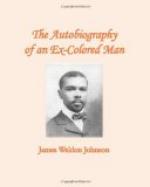For several days, together with other topics, we discussed the race problem, not only of the United States, but as it affected native Africans and Jews. Finally, before we reached Boston, our conversation had grown familiar and personal. I had told him something of my past and much about my intentions for the future. I learned that he was a physician, a graduate of Howard University, Washington, and had done post-graduate work in Philadelphia; and this was his second trip abroad to attend professional courses. He had practiced for some years in the city of Washington, and though he did not say so, I gathered that his practice was a lucrative one. Before we left the ship, he had made me promise that I would stop two or three days in Washington before going on south.
We put up at a hotel in Boston for a couple of days and visited several of my new friend’s acquaintances; they were all people of education and culture and, apparently, of means. I could not help being struck by the great difference between them and the same class of colored people in the South. In speech and thought they were genuine Yankees. The difference was especially noticeable in their speech. There was none of that heavy-tongued enunciation which characterizes even the best-educated colored people of the South. It is remarkable, after all, what an adaptable creature the Negro is. I have seen the black West Indian gentleman in London, and he is in speech and manners a perfect Englishman. I have seen natives of Haiti and Martinique in Paris, and they are more Frenchy than a Frenchman. I have no doubt that the Negro would make a good Chinaman, with exception of the pigtail.




